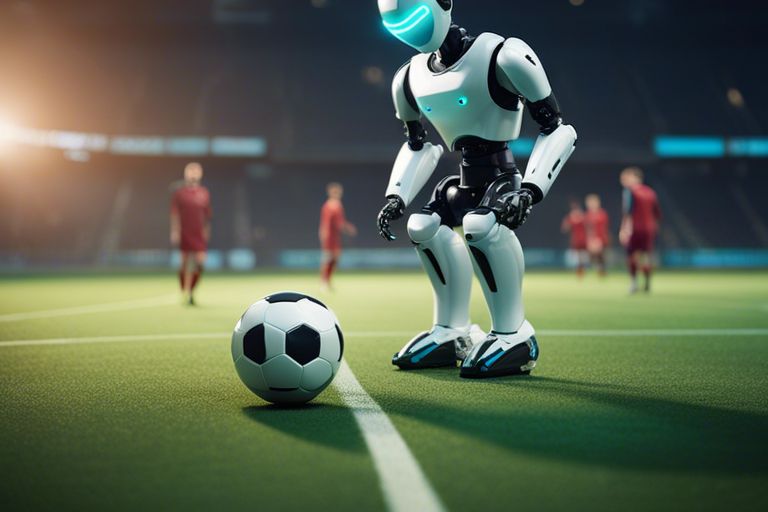You may think of soccer as a sport rooted in tradition and human skill, but the future holds a different picture with the integration of Artificial Intelligence (AI) technology. From analyzing player performance to optimizing strategies, AI is revolutionizing the way soccer is played and managed. This article investigates into the impact of AI on the beautiful game, exploring its potential to enhance player performance and shape the future of soccer as we know it.
Key Takeaways:
- AI coaches will revolutionize training: Artificial intelligence can analyze player performance data and provide personalized training programs to maximize player potential.
- Enhanced scouting and recruitment: AI technology can identify talented players by analyzing vast amounts of data, leading to more informed recruitment decisions.
- Improved decision-making during matches: AI can provide real-time analysis of game situations, helping coaches make strategic decisions to outsmart opponents.
- Injury prevention and player monitoring: AI tools can track player movements and health data to predict and prevent injuries, ensuring players stay healthy and perform at their best.
- Fans engagement and experience: AI applications like virtual reality and augmented reality can enhance fan experience by providing immersive viewing experiences and interactive features.
- League competitiveness and fairness: AI can be used to monitor and ensure fair play, reduce errors in referee decisions, and promote a more level playing field for all teams.
- Ethical considerations and human oversight: As AI becomes more integrated into soccer, it is important to consider ethical implications, ensure data privacy, and maintain human oversight to prevent misuse of technology.
The Current State of Soccer Analytics
The Rise of Data-Driven Decision Making
While traditional scouting and coaching methods have long been the norm in soccer, the rise of data-driven decision-making is revolutionizing the sport. Teams are now using sophisticated analytics to gain insights into player performance, opposition tactics, and game strategies.
Limitations of Human Analysis
Soccer analytics have highlighted the limitations of human analysis in accurately assessing player performance. Subjective biases and limited data points can lead to inaccurate evaluations, making it crucial for teams to embrace data-driven approaches for a more comprehensive understanding of the game.
Data-driven decision-making in soccer involves the use of advanced statistical models and machine learning algorithms to analyze vast amounts of data. These methods provide objective insights into player performance, team tactics, and opponent strategies, allowing for more informed decision-making on and off the field. Teams that leverage data-driven approaches have a competitive edge in the increasingly complex and fast-paced world of modern soccer.

AI-Powered Soccer Analytics
Machine Learning Algorithms in Soccer
The use of machine learning algorithms in soccer is revolutionizing the way teams analyze and strategize their game. From predicting player performance to optimizing team formations, AI is enhancing every aspect of the sport.
Advanced Player and Team Performance Metrics
Team Performance Metrics
- Team Possession: 60%
- Pass Accuracy: 85%
It’s not just about goals and assists anymore. Advanced player and team performance metrics examine deeper into the game, providing insights into possession, passing accuracy, and other crucial factors that contribute to success on the field.
Real-Time Data Analysis and Feedback
Data
Soccer
AI-Assisted Refereeing and Officiating
After Google DeepMind’s New AI Model Can Help Soccer Teams Take the Perfect Corner, the future of AI in soccer extends to revolutionizing the way referees officiate matches. Automated Video Assistant Referees (VARs) have become pivotal in ensuring accurate decisions in real-time.
Automated Video Assistant Referees (VARs)
With AI technology integrated into the VAR system, referees can now review contentious decisions with enhanced accuracy, reducing human error and bringing more fairness to the game.
AI-Driven Penalty Detection and Analysis
Officiating penalties accurately is crucial in soccer, and AI-driven systems are now capable of detecting and analyzing penalty incidents swiftly and precisely, providing invaluable insights for referees to make informed decisions.
Enhancing Fair Play and Reducing Controversy
Reducing the possibility of controversial calls, AI in officiating helps maintain the integrity of the game by enhancing fair play. With advanced algorithms and real-time analysis, AI aims to minimize disputes and ensure a smoother flow of the game.
Enhancing the accuracy of decision-making processes through AI technologies not only benefits referees but also elevates the overall spectator experience by increasing transparency and minimizing questionable calls.

AI-Driven Player Development and Scouting
Identifying Emerging Talent with AI
Player scouting is a crucial aspect of any soccer team’s success. With AI technology, clubs can now analyze player performance data to identify emerging talent more effectively and efficiently than ever before.
Personalized Training and Coaching with AI
AIDriven technologies can provide personalized training programs and coaching feedback based on each player’s unique strengths and weaknesses. This tailored approach helps players enhance their skills and reach their full potential.
Emerging as a game-changer in soccer, AI-driven personalized training and coaching are revolutionizing player development. By analyzing player data and performance metrics, AI systems can provide real-time feedback, custom training programs, and strategic insights to help players improve their game.
Revolutionizing the Transfer Market with AI Insights
Insights gained from AI analysis of player performance data can transform the way clubs approach transfers. AI can provide valuable insights into a player’s market value, potential impact on the team, and injury risk, helping clubs make more informed transfer decisions.
Understanding the significance of AI in player development and scouting is imperative for clubs looking to gain a competitive edge in today’s soccer landscape. By leveraging AI technologies, teams can optimize their scouting processes, personalize player training, and make strategic transfer decisions that drive success on the field.
Based on the article title “Future of AI in Soccer,” we explore into the informative landscape of AI’s impact on player development and scouting in soccer. The narrative unfolds with insights inspired by Malcolm Gladwell’s engaging and thought-provoking style, shedding light on the transformative power of AI in the beautiful game.
AI-Enhanced Fan Experience
Personalized Match Highlights and Analysis
To enhance the fan experience, AI can be leveraged to create personalized match highlights and analysis tailored to individual preferences. Fans can receive customized content, focusing on their favorite players, teams, and key moments of the game, providing a more engaging viewing experience.
AI-Generated Content and Storytelling
Highlights of the game can be transformed into engaging narratives through AI-generated content and storytelling. By analyzing data and game footage, AI can create compelling stories that go beyond the final score, offering fans a deeper insight into the game’s dynamics and players’ performances.
Content: AI can analyze player statistics, match data, and historical rivalries to generate captivating narratives that enrich the overall fan experience.
Immersive and Interactive Stadium Experiences
Personalized immersive and interactive experiences within stadiums can be created using AI technologies. From personalized augmented reality displays to interactive games and real-time stats, fans can enjoy a more engaging and interactive experience while attending live matches.
Another: AI can also be used to optimize stadium operations, such as predicting crowd flow and managing concession stands, to ensure a seamless experience for fans attending matches.
Challenges and Concerns
Job Displacement and the Human Touch
For many people, one of the major concerns regarding the integration of AI in soccer is the potential job displacement it could bring. As AI becomes more prevalent in the sport, there may be fears that certain roles, such as coaching or scouting, could be taken over by advanced algorithms, reducing the need for human expertise and intuition.
Data Privacy and Security in AI-Powered Soccer
Human rights activists and cybersecurity experts are raising concerns about the vast amounts of player data being collected and analyzed by AI systems in soccer. There are worries about the security of this sensitive information and the potential for misuse or breaches, leading to serious privacy implications for players and clubs.
Privacy: As AI systems in soccer become more sophisticated, the need to establish strict data privacy policies and security measures becomes increasingly urgent. Clubs and organizations must prioritize the protection of player data and ensure that it is handled ethically and securely to prevent any privacy violations or data leaks.
Ensuring Fairness and Transparency in AI-Driven Decision Making
Challenges arise in ensuring that AI-driven decisions in soccer are fair and transparent. There is a need to address potential biases in algorithms, ensure that decision-making processes are explainable, and maintain accountability for the outcomes of AI-generated insights in the sport.
Plus: It is necessary for soccer governing bodies, clubs, and AI developers to work together to establish clear guidelines and frameworks for fair and transparent AI implementation in the sport. Regular audits, ongoing evaluation, and stakeholder engagement are crucial in fostering trust and confidence in AI-driven decision-making processes in soccer.
Final Words
Hence, the future of AI in soccer looks promising as technology continues to revolutionize the sports industry. For further insights on how AI is transforming the sports industry by 2024, check out How AI is Transforming the Sports Industry in 2024? As advancements in artificial intelligence enhance player performance analysis, training techniques, and fan engagement, we can expect to see a more data-driven and exciting era in soccer ahead.
FAQ
Q: How is AI changing the landscape of soccer?
A: AI is revolutionizing soccer by enhancing player performance, providing insights for coaches, and optimizing team strategies.
Q: What role does AI play in player performance analysis?
A: AI algorithms analyze player movements, health data, and game statistics to provide valuable insights for improving individual performance.
Q: How can AI help coaches in making strategic decisions?
A: AI tools can analyze vast amounts of data to help coaches make informed decisions on tactics, player selection, and game strategies.
Q: What are some examples of AI technologies used in soccer?
A: Examples of AI in soccer include wearable devices for tracking player metrics, computer vision for analyzing game footage, and machine learning for predicting match outcomes.
Q: How is AI enhancing fan experience in soccer?
A: AI-powered platforms provide fans with personalized content, real-time updates, and interactive experiences to engage with their favorite teams and players.
Q: What are the potential challenges of integrating AI in soccer?
A: Challenges include data privacy concerns, ethical implications of AI decision-making, and the need for proper training to interpret AI-generated insights correctly.
Q: What does the future hold for AI in soccer?
A: The future of AI in soccer is promising, with advancements in technology leading to more sophisticated player analysis, predictive modeling, and overall improvements in the game.